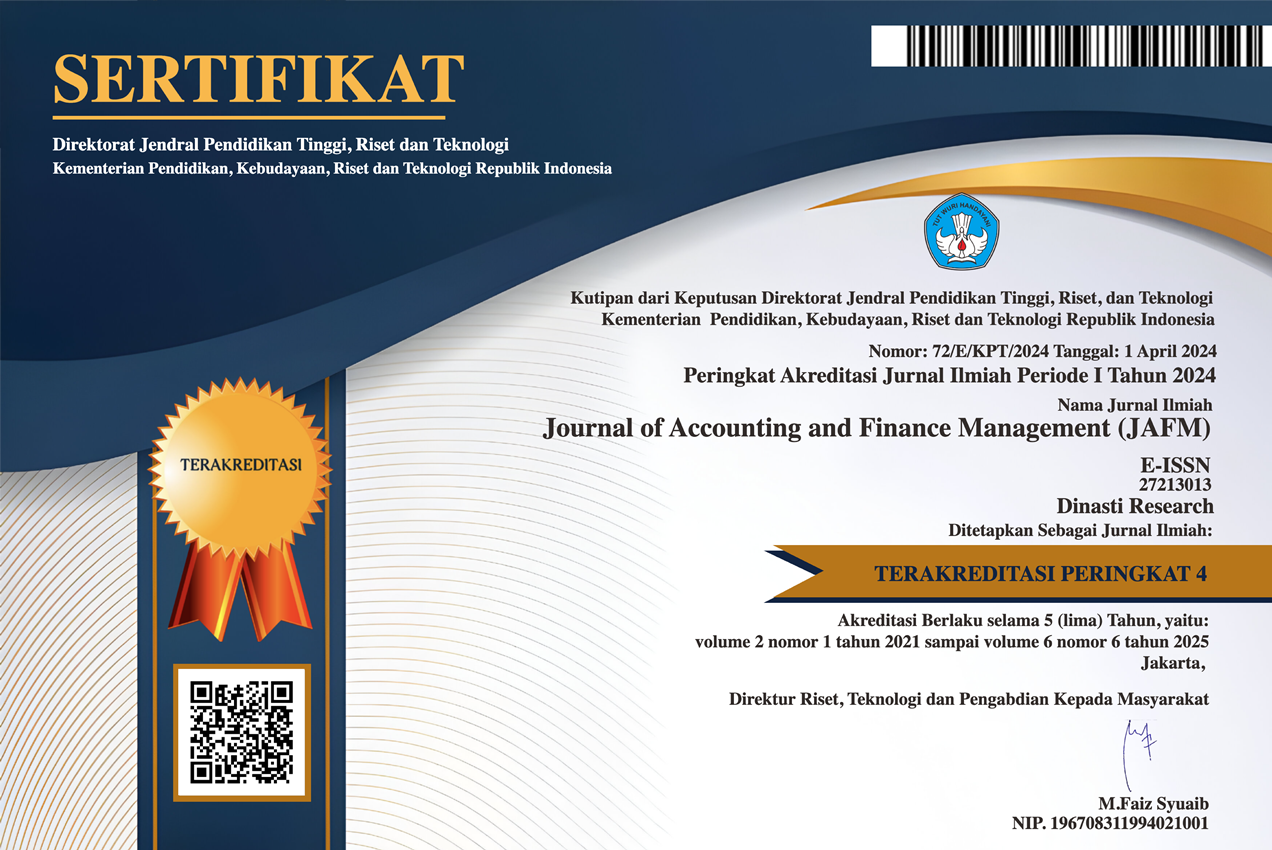The Effect of Green Banking Implementation and Financial Performance on Bank Profitability in Indonesia
DOI:
https://doi.org/10.38035/jafm.v6i2.1977Keywords:
Green Banking, Financial Performance, Green Accounting, Profit, ProfitabilityAbstract
This study aims to analyze the effect of green banking implementation and financial performance on the profitability of commercial banks in Indonesia in the period 2013-2023. This research uses a quantitative descriptive approach with secondary data obtained from the annual reports of eight commercial banks and other relevant literature. Data analysis was conducted using panel data regression, with the best model selection through Chow and Hausman tests. The results showed that GBDI, NPL, and BOPO had a significant negative effect on ROA. GBDI, which should encourage profitability, has a negative impact, indicating that the implementation of green banking is not optimal and requires time and long-term adaptation strategies. CAR and LDR did not show a significant effect on ROA. In conclusion, bank profitability in Indonesia has not been fully driven by green banking practices and other financial indicators consistently. Therefore, sustained commitment and a more comprehensive implementation strategy are needed to make green banking a sustainable driver of profitability.
References
Afifah, A., Listiana, E., Wendy, W., Mustarudin, M., & Giriati, G. (2023). The impact of green finance on profitability with credit risk as an intervening variable. International Journal of Applied Finance and Business Studies, 11(3), 564–575.
Ahmad, N., & Hassan, R. (2019). Green Banking Initiatives And Environmental Performance: A Comparative Study Of Conventional And Islamic Banks. Journal Of Cleaner Production, 237, 117754.
Anggraini, D., Aryani, D., & Prasetyo, I. B. (2020). Analisis implementasi green banking dan kinerja keuangan terhadap profitabilitas bank di Indonesia (2016-2019). JBMI (Jurnal Bisnis, Manajemen, Dan Informatika), 17(2), 141–161.
Ayu, A. N. F., & Anityasari, M. (2013). Analisis Implementasi Green BankingPada PT Bank X (Persero) Tbk. Jurnal Teknik Pomits, 1(1), 1–6.
Budiantoro, S. (2014). Mengawal Green Banking Indonesia Dalam Kerangka Pembangunan Berkelanjutan. Jakarta: Perkumpulan Prakarsa.
Handajani, L., Rifai, A., & Husnan, L. H. (2019). Study of the initiation of green banking practices at state-owned bank. Jurnal Economia, 15(1), 1–16.
Islam, M. S., & Das, P. C. (2013). Green banking practices in Bangladesh. IOSR Journal of Business and Management, 8(3), 39–44.
Puspitasari, A. P., & Wulandari, S. (2022). Analisis Faktor yang Mempengaruhi Tax Avoidance Perusahaan Perbankan. Jurnal Ilmiah Akuntansi Kesatuan, 10(2), 341–352.
Rachman, A. A., & Saudi, M. H. (2021). Green Banking And Profitability (Banks Registered On The Sri-Kehati Index In Indonesia Stock Exchange 2015-2019). Turkish Journal of Computer and Mathematics Education, 12(8), 473–486.
Ramdani, R., Mawardi, I., & Sulaeman, S. (2023). Impact of Green Banking Implementation, Financial Performance, and Covid-19 Crisis on Islamic Bank Profitability in Indonesia. International Journal of Islamic Economics and Finance (IJIEF), 6(2), 225–246.
Ratnasari, T., Surwanti, A., & Pribadi, F. (2021). Implementation of Green Banking and Financial Performance on Commercial Banks in Indonesia. International Symposia in Economic Theory and Econometrics, 28, 317–329.
Tia, C., Hasnawati, S., & Faisol, A. (2023). The impact of green banking on profitability (study on banking sector listed on Indonesia stock exchange (idx) period 2016-2022). International Journal of Asian Business and Management, 2(6), 887–900.
Weber, O. (2016). The impact of green banking guidelines on the sustainability performance of banks: the Chinese case.
Downloads
Published
How to Cite
Issue
Section
License
Copyright (c) 2025 Satia Tampikalih, Syafri Syafri

This work is licensed under a Creative Commons Attribution 4.0 International License.
Authors who publish their manuscripts in this journal agree to the following conditions:
- The copyright on each article belongs to the author(s).
- The author acknowledges that the Journal of Accounting and Finance Management (JAFM) has the right to be the first to publish with a Creative Commons Attribution 4.0 International license (Attribution 4.0 International (CC BY 4.0).
- Authors can submit articles separately, arrange for the non-exclusive distribution of manuscripts that have been published in this journal into other versions (e.g., sent to the author's institutional repository, publication into books, etc.), by acknowledging that the manuscript has been published for the first time in the Journal of Accounting and Finance Management (JAFM).



























